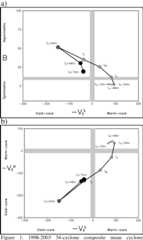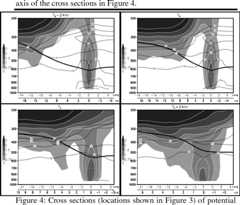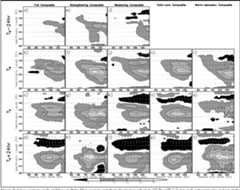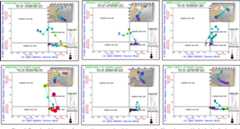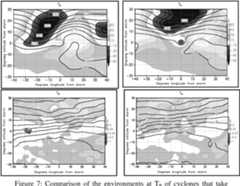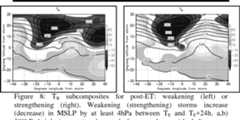DOI:10.1175/MWR3082.1 - Corpus ID: 3742254
Synoptic Composites of the Extratropical Transition Life Cycle of North Atlantic Tropical Cyclones: Factors Determining Posttransition Evolution
@article{Hart2006SynopticCO, title={Synoptic Composites of the Extratropical Transition Life Cycle of North Atlantic Tropical Cyclones: Factors Determining Posttransition Evolution}, author={Robert E. Hart and Jenni L. Evans and Clark Evans}, journal={Monthly Weather Review}, year={2006}, volume={134}, pages={553-578}, url={https://api.semanticscholar.org/CorpusID:3742254}}Abstract A 34-member ensemble-mean trajectory through the cyclone phase space (CPS) is calculated using Navy Operational Global Atmospheric Prediction System (NOGAPS) analyses for North Atlantic tropical cyclones (TCs) undergoing extratropical transition (ET). Synoptic composites at four ET milestones are examined: 24 h prior to the beginning of ET (TB − 24), the beginning of ET (TB), the end of ET (TE), and 24 h after the end of ET (TE + 24). While the extratropically transitioning TC…
107 Citations
Figures and Tables from this paper
107 Citations
Extratropical Transition of Tropical Cyclones in the Western North Pacific: Their Frontal Evolution
- N. Kitabatake
- 2008
Environmental Science
Abstract Extratropical transition (ET) in the western North Pacific during 2001–02 is examined in terms of frontal evolution and its environment using a gridded global analysis dataset produced by…
Development of frontal boundaries during the extratropical transition of tropical cyclones
- Evan JonesR. ParfittAllison A. Wing
- 2023
Environmental Science, Physics
This study seeks to characterize the development of atmospheric fronts during the extratropical transition (ET) of tropical cyclones (TCs) as a function of their evolution during ET. Composite…
Cyclone phase space characteristics of the extratropical transitioning tropical cyclones over the western North Pacific
- Jinjie SongJuejing HanYuan Wang
- 2011
Environmental Science, Geography
The cyclone phase space (CPS) method has been utilized to evaluate the extratropical transition (ET) of tropical cyclones (TCs) in many recent publications. However, these studies mainly focused over…
Extratropical transition of tropical cyclones in a multiresolution ensemble of atmosphere-only and fully coupled global climate models
- A. BakerM. RobertsL. Terray
- 2022
Environmental Science
Tropical cyclones undergo extratropical transition (ET) in every ocean basin. Projected changes in ET frequency under climate change are uncertain and differ between basins, so multimodel studies…
The extratropical transition of tropical cyclones. Part I: Cyclone evolution and direct impacts
- C. EvansKimberly M. WoodFuqing Zhang
- 2017
Environmental Science
AbstractExtratropical transition (ET) is the process by which a tropical cyclone, upon encountering a baroclinic environment and reduced sea surface temperature at higher latitudes, transforms into…
The Extratropical Transition of Tropical Cyclones: Structural Characteristics, Downstream Impacts, and Forecast Challenges
- P. Harr
- 2010
Environmental Science
The process of extratropical transition (ET) occurs when a tropical cyclone moves poleward into the midlatitudes. During ET a decaying tropical cyclone frequently re-intensifies as an intense…
13A.5 THE EXTRATROPICAL TRANSITION OF HURRICANE HELENE (2006): OBSERVATION OF STRUCTURAL EVOLUTION AND OPERATIONAL MODEL EVALUATION USING QUIKSCAT
- M. BrennanJ. RhomeR. Knabb
- 2007
Environmental Science, Physics
The evolution of the horizontal wind field of a tropical cyclone (TC) as it undergoes extratropical transition (ET) determines the distribution of hazardous conditions around the cyclone as it moves…
Determination of a Consistent Time for the Extratropical Transition of Tropical Cyclones. Part I: Examination of Existing Methods for Finding “ET Time”
- D. KofroňE. RitchieJ. Tyo
- 2010
Environmental Science
Abstract As a tropical cyclone moves poleward and interacts with the midlatitude circulation, the question of whether it will undergo extratropical transition (ET) and, if it does, whether it will…
Characteristics and development of European cyclones with tropical origin in reanalysis data
- M. DekkerR. HaarsmaH. VriesM. BaatsenA. Delden
- 2017
Environmental Science, Geography
Major storm systems over Europe frequently have a tropical origin. This paper analyses the characteristics and dynamics of such cyclones in the observational record, using MERRA reanalysis data for…
Synoptic- and Frontal-Scale Influences on Tropical Transition Events in the Atlantic Basin. Part I: A Six-Case Survey
- A. HulmeJonathan E. Martin
- 2009
Environmental Science
Abstract The process by which a baroclinic, vertically sheared, extratropical cyclone is transformed into a warm-core, vertically stacked tropical cyclone is known as tropical transition. Six recent…
...
52 References
Objective Indicators of the Life Cycle Evolution of Extratropical Transition for Atlantic Tropical Cyclones
Abstract Forty-six percent of Atlantic tropical storms undergo a process of extratropical transition (ET) in which the storm evolves from a tropical cyclone to a baroclinic system. In this paper, the…
Extratropical Transition of Western North Pacific Tropical Cyclones: An Overview and Conceptual Model of the Transformation Stage
- P. M. KleinP. HarrR. Elsberry
- 2000
Environmental Science
Abstract Extratropical transition (ET) in the western North Pacific is defined here in terms of two stages: transformation, in which the tropical cyclone evolves into a baroclinic storm; and…
Extratropical transition of western North Pacific tropical cyclones: Midlatitude and tropical cyclone contributions to reintensification
- P. M. KleinP. HarrR. Elsberry
- 1997
Environmental Science
Abstract This study of extratropical transition of western North Pacific tropical cyclones (TCs) addresses the reintensification stage during which the TC remnants develop as an extratropical…
The Impact of Tropical Remnants on Extratropical Cyclogenesis: Case Study of Hurricanes Danielle and Earl (1998)
- R. McTaggart‐CowanJ. GyakumM. Yau
- 2004
Environmental Science
Abstract The importance of remnant tropical cyclone (TC) circulation and moisture structures is investigated for a simultaneous extratropical transition (ET) event involving ex-Hurricanes Danielle…
The extratropical transition of hurricane Irene (1999): A potential‐vorticity perspective
- A. Agustí-PanaredaC. ThorncroftG. CraigS. Gray
- 2004
Environmental Science
Extratropical transition (ET) of tropical cyclones is common in all ocean basins where tropical cyclones recurve polewards. After the tropical cyclone experiences ET, a rapid deepening can take place…
Characterization of Extratropical Transition Using Cluster Analysis
- J. ArnottJ. EvansFrancesca Chiaromonte
- 2004
Environmental Science
Abstract The extratropical transition (ET) of tropical cyclones in the North Atlantic basin is explored using the framework of the Cyclone Phase Space (CPS). Analyses from the U.S. Navy Operational…
The extratropical transition of tropical cyclones : forecast challenges, current understanding, and future directions
- S. JonesP. HarrC. Thorncroft
- 2003
Environmental Science
Abstract A significant number of tropical cyclones move into the midlatitudes and transform into extratropical cyclones. This process is generally referred to as extratropical transition (ET). During…
Simulations of the Transformation Stage of the Extratropical Transition of Tropical Cyclones
- E. RitchieR. Elsberry
- 2001
Environmental Science
Abstract The physical mechanisms associated with the transformation stage of the extratropical transition of a tropical cyclone are simulated with a mesoscale model using initial environmental…
Extratropical transition of tropical cyclones over the Western North pacific. Part II: The impact of midlatitude circulation characteristics
- P. HarrR. ElsberryT. Hogan
- 2000
Environmental Science, Geography
Abstract Two characteristic midlatitude circulation patterns (labeled northwest and northeast) are found to be associated with extratropical transition (ET) of tropical cyclones over the western…
Extratropical Transition of Tropical Cyclones over the Western North Pacific. Part I: Evolution of Structural Characteristics during the Transition Process
- P. HarrR. Elsberry
- 2000
Environmental Science
Abstract The development of extratropical cyclone structural characteristics that resulted from the extratropical transition of Typhoon (TY) David (1997) and TY Opal (1997) over the western North…
...
Related Papers
Showing 1 through 3 of 0 Related Papers
